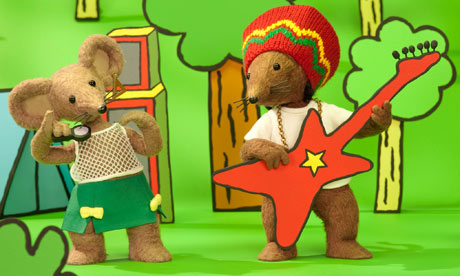
Not since the Teletubbies said "eh-oh" has a children's TV show been this talked about. Rastamouse might have skateboarded onto CBeebies a mere fortnight ago, but the crime-fighting, reggae-playing rodent has already gathered a righteous cult following. And, of course, a backlash.
Our furry hero's voice is provided by Radio 1 DJ Reggie Yates. Some very well-known people auditioned, Boardman says. "They came in desperate to pitch us their best Rastamouse voice, then Reggie came in and stole the day. He's now getting a lot of requests for Rastamouse impressions."
That may be something of an understatement. Last week saw Rastamouse trending on Twitter, with the starry likes of Lily Allen, Emma Freud, Dizzee Rascal, Lauren Laverne and Rob Da Bank professing their devotion. Rastamouse is now the most-watched CBeebies show on iPlayer. Facebook fans number 9,000 and rising. Students are crawling out of bed to watch it. YouTube DJs have remixed Rastamouse with Tinie Tempah and dubstep tunes. Rastamouse's band, Da Easy Crew, even have a single out – the brassy skank of Ice Popp, released by EMI and penned by Mr Scruff collaborator Andy Kingslow.
"All this attention is a wonderful pat on the back but social networking sites and the media are obviously skewed towards adults," Boardman says. "In many ways, we've got to ignore it and carry on making what is at heart a pre-school kids' show. We absolutely don't put in jokes just for the parents. Humour is never intended to go over the kids' heads."
Yet the approval hasn't been unanimous. The BBC has received complaints from six viewers that it stereotypes black people. Another 95 have complained about the patois spoken by the animated characters. These issues have been debated in black newspaper The Voice and, perhaps predictably, on Mumsnet.
So is Rastamouse patronising towards black culture or reinforcing negative stereotypes? Boardman insists not. "We're a strongly multicultural production company making a programme about characters co-created by a Rastafarian," he says. "We think they're great models who use logic and problem-solving for the good of a positive, creative community."
And what about parental concerns that the patois could teach bad linguistic habits? "The show has a strong message: through love, understanding and respect, Rastamouse will make a bad thing good," says Boardman. "The whole package – music, colour, rhythm and rhyme of speech – engages kids and enables that message to be heard by a wider audience … I heard yesterday about a boy who was being bullied by a classmate and told his teacher, 'I'm giving him time to make a bad ting good.'" That's Rastamouse's message: redemption not retribution.
Rastamouse has also been seized upon by conspiracy theorists claiming that "cheese", oft-featured in a show about mice, is code for marijuana – and that the characters even make smoking gestures when they mention it.
"We're aware people have been reading things into it," laughs Boardman, "but that's the first I've heard about smoking gestures. I promise you, we never intentionally put in innuendo or anything that isn't age-appropriate. We're a family brand, we're on CBeebies and we're very careful. We can't make it as cult viewing, even though it may later end up as cult viewing. So while we love that the fact that they're watching, the students and messageboarders are barking up the wrong tree."
So have you been watching our red, gold and green hero? Is Rastamouse irie or vexin'? Let us know below.
How is the language issue represented?
To me, the article shows a very balanced argument about the Rastamouse controversy. The author is quite positive about the program, and includes quotes from the creators of the show "The show has a strong message: through love, understanding and respect, Rastamouse will make a bad thing good".
However the author also includes negative information from parents about the show "Rastamouse has also been seized upon by conspiracy theorists claiming that "cheese", oft-featured in a show about mice, is code for marijuana".
Having both negative and positive points included in his article gives the controversy a fairly balanced representation.
How does the author represent him/herself and others?
Generally, I think the author represents himself as
How does the author shape the readers response (audience positioning)?
looking forward to the other answers :)
ReplyDelete